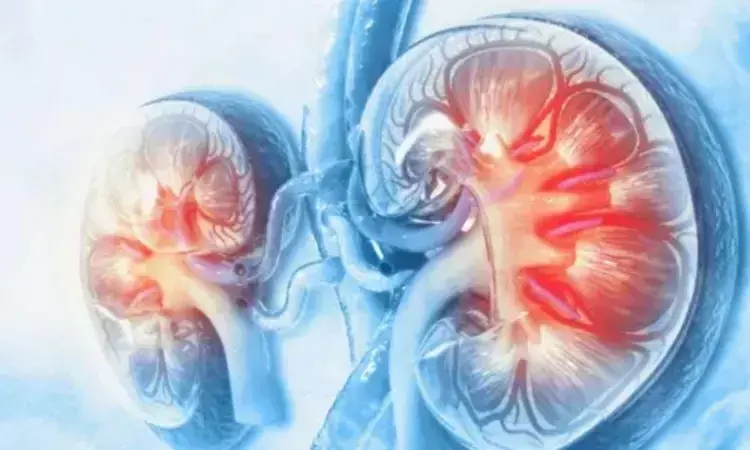- Home
- Medical news & Guidelines
- Anesthesiology
- Cardiology and CTVS
- Critical Care
- Dentistry
- Dermatology
- Diabetes and Endocrinology
- ENT
- Gastroenterology
- Medicine
- Nephrology
- Neurology
- Obstretics-Gynaecology
- Oncology
- Ophthalmology
- Orthopaedics
- Pediatrics-Neonatology
- Psychiatry
- Pulmonology
- Radiology
- Surgery
- Urology
- Laboratory Medicine
- Diet
- Nursing
- Paramedical
- Physiotherapy
- Health news
- Fact Check
- Bone Health Fact Check
- Brain Health Fact Check
- Cancer Related Fact Check
- Child Care Fact Check
- Dental and oral health fact check
- Diabetes and metabolic health fact check
- Diet and Nutrition Fact Check
- Eye and ENT Care Fact Check
- Fitness fact check
- Gut health fact check
- Heart health fact check
- Kidney health fact check
- Medical education fact check
- Men's health fact check
- Respiratory fact check
- Skin and hair care fact check
- Vaccine and Immunization fact check
- Women's health fact check
- AYUSH
- State News
- Andaman and Nicobar Islands
- Andhra Pradesh
- Arunachal Pradesh
- Assam
- Bihar
- Chandigarh
- Chattisgarh
- Dadra and Nagar Haveli
- Daman and Diu
- Delhi
- Goa
- Gujarat
- Haryana
- Himachal Pradesh
- Jammu & Kashmir
- Jharkhand
- Karnataka
- Kerala
- Ladakh
- Lakshadweep
- Madhya Pradesh
- Maharashtra
- Manipur
- Meghalaya
- Mizoram
- Nagaland
- Odisha
- Puducherry
- Punjab
- Rajasthan
- Sikkim
- Tamil Nadu
- Telangana
- Tripura
- Uttar Pradesh
- Uttrakhand
- West Bengal
- Medical Education
- Industry
One in five patients develop Post-operative Acute Kidney Injury after Major Surgery

EPIS-AKI trial which is a comprehensive, multinational study, reported that post-operative acute kidney injury (PO-AKI) occurs in nearly one out of five patients who underwent urologic, cardiac, and vascular surgery. The main risk factors for the occurrence of PO-AKI were the intraoperative use of vasopressors and the use of aminoglycosides. PO-AKI resulted in adverse outcomes like increased mortality and hospital stay.
The trial results were published in the journal - Intensive Care Medicine on 28 July 2023.
Major surgeries have the risk of associated post-operative acute kidney injury. Abdominal and cardiac surgeries have an increased incidence of PO-AKI. As there is uncertainty on the incidence and the outcomes of PO-AKI, researchers conducted a prospective, observational, multicenter, cohort study in 30 countries in patients undergoing major surgery.
Patients aged 18 years and above and undergoing major surgery that lasted more than 2 hours with the need for subsequent intensive care unit (ICU) or high dependency unit admission were recruited in the study. The primary endpoint was the occurrence of PO-AKI within 72 h of surgery defined by the Kidney Disease: Improving Global Outcomes (KDIGO) criteria. Secondary endpoints included PO-AKI severity and duration, use of renal replacement therapy (RRT), mortality, and ICU and hospital length of stay. For statistical analysis, fisher's exact test and Pearson’s Chi-squared test were used to compare categorical variables between groups.
Key findings:
- About 10,568 patients were examined, and 1945 (18.4%) developed PO-AKI.
- Nearly 1236 (63.5%) were in KDIGO Stage 1, 500 (25.7%) were in KDIGO Stage 2, and 209 (10.7%) were in KDIGO Stage 3.
- In 33.8% of patients, PO-AKI was persistent, and 170/1945 (8.7%) of patients with PO-AKI received RRT in the ICU.
- Patients with PO-AKI had greater ICU and hospital mortality and longer length of stay.
- Risk factors for PO-AKI included older age, comorbidities (hypertension, diabetes, chronic kidney disease), type, duration, and urgency of surgery as well as intraoperative vasopressors, and aminoglycosides administration.
Thus, this first prospective international observational trial conducted across multiple geographic settings and country-based income levels provided important data on the occurrence rate, morbidity, and mortality of PO-AKI.
Further reading: Zarbock, A., Weiss, R., Albert, F. et al. Epidemiology of surgery-associated acute kidney injury (EPIS-AKI): a prospective international observational multi-center clinical study. Intensive Care Med (2023). https://doi.org/10.1007/s00134-023-07169-7
BDS, MDS
Dr.Niharika Harsha B (BDS,MDS) completed her BDS from Govt Dental College, Hyderabad and MDS from Dr.NTR University of health sciences(Now Kaloji Rao University). She has 4 years of private dental practice and worked for 2 years as Consultant Oral Radiologist at a Dental Imaging Centre in Hyderabad. She worked as Research Assistant and scientific writer in the development of Oral Anti cancer screening device with her seniors. She has a deep intriguing wish in writing highly engaging, captivating and informative medical content for a wider audience. She can be contacted at editorial@medicaldialogues.in.
Dr Kamal Kant Kohli-MBBS, DTCD- a chest specialist with more than 30 years of practice and a flair for writing clinical articles, Dr Kamal Kant Kohli joined Medical Dialogues as a Chief Editor of Medical News. Besides writing articles, as an editor, he proofreads and verifies all the medical content published on Medical Dialogues including those coming from journals, studies,medical conferences,guidelines etc. Email: drkohli@medicaldialogues.in. Contact no. 011-43720751



